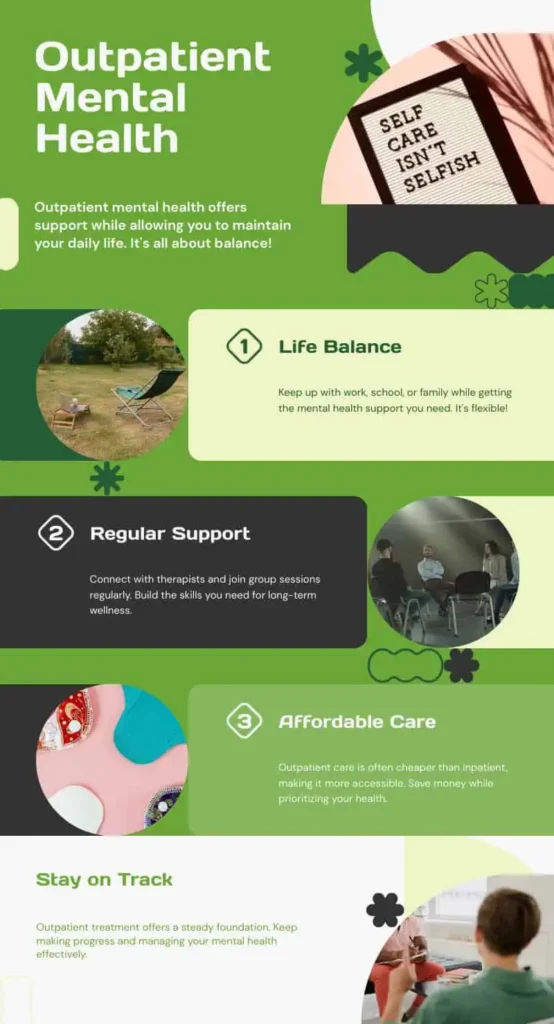What is outpatient mental health treatment? This treatment format entails clients coming to a treatment center on a regular schedule to attend sessions while still living at home. Outpatient treatment can provide greater flexibility for those looking to balance other obligations with treatment. Sessions can include therapy, group meetings, and holistic activities.
If you’ve been asking yourself what is outpatient mental health treatment, you’re not alone. Outpatient mental health care is a flexible, structured way to get help without needing to stay overnight in a facility. It’s designed for individuals managing moderate symptoms, transitioning out of a residential program, or those who simply need consistent support while maintaining their day-to-day life.
Instead of living on-site, clients attend scheduled therapy sessions—usually a few times a week—while continuing to work, go to school, or care for their families.
This approach makes mental care more accessible and less disruptive, especially for those with stable home environments.
Understanding Outpatient Mental Health Treatment
Outpatient mental health treatment gives you the support you need, without having to leave home. It’s designed for people who are managing their mental health but don’t need the 24/7 structure of inpatient care.
You’ll still get access to therapy, medication management, and other services, but you return home after each session. That means you can continue your routine—work, school, family—while getting consistent professional support.
One of the benefits of outpatient care is its flexibility.
Sessions are often scheduled during the day or evening, depending on your needs and the level of care. It’s a great fit if you have a safe living environment and a solid support system in place.
Outpatient care comes in a few different forms, each offering a different level of structure:
- Traditional Outpatient Program (OP): 1–2 sessions per week—great for ongoing support or occasional check-ins
- Intensive Outpatient Program (IOP): 3–5 sessions per week—ideal if you need more regular structure without stepping away from daily life
- Partial Hospitalization Program (PHP): 5 days a week for several hours per day—the most intensive outpatient level, often used after inpatient care
These options enable you to obtain the right level of support, precisely when you need it.

Benefits of Outpatient Treatment for Mental Health
Outpatient mental health treatment offers unique advantages, especially for individuals who need help but also want to maintain their everyday responsibilities.
- Flexibility to continue work, school, or family life: Because outpatient care doesn’t require an overnight stay, it’s easier to balance treatment with other parts of your life. This makes it a strong option for parents, students, and working professionals who still need consistent support.
- Access to regular support and structured therapy: Even though you’re not living at a facility, outpatient programs still provide access to licensed therapists, group sessions, and evidence-based therapies on a regular schedule. You’ll stay connected to a supportive care team while building the tools needed for long-term wellness.
- Lower cost than inpatient or residential options: Outpatient care is typically more affordable than 24/7 treatment programs, which often include housing, meals, and around-the-clock staffing. This can make it a more accessible choice for those with limited insurance coverage or financial resources.
- Outpatient care can be a powerful tool, whether you’re easing out of a hospital stay or just beginning to seek support. For many people, it’s a way to keep making progress after inpatient or residential treatment, offering structure without full-time commitment. Others start with outpatient services to manage symptoms and see how much support they need. No matter where you’re starting from, outpatient treatment creates a steady foundation to help you stay on track.
Choosing the Right Mental Health Support
Outpatient mental health treatment offers a flexible and supportive way to work on your mental health without putting your life on hold.
Exploring different levels of outpatient care—OP, IOP, or PHP—can help you find the right fit for your needs and lifestyle.
If you’re in Georgia or nearby, St. Mary’s Wellness offers comprehensive mental health treatment with a warm, compassionate approach. Whether you’re looking for residential care or planning for a step-down into outpatient treatment, we’re here to help you move forward.
FAQs About Outpatient Mental Health Treatment
What types of therapy are part of outpatient mental health programs?
Most programs incorporate evidence-based approaches, such as Cognitive Behavioral Therapy (CBT) and Dialectical Behavior Therapy (DBT), along with group sessions and, in many cases, family therapy to enhance your support system.
You might also find mindfulness practices, art therapy, or other trauma-informed modalities woven into care. The types of therapy—and how often you participate—depend on whether you’re in a traditional outpatient program or a more structured level like IOP or PHP.
How many days a week is outpatient therapy?
The frequency of outpatient therapy depends on the level of care. Traditional outpatient programs may involve therapy once or twice a week. Intensive Outpatient Programs (IOP) typically meet three to five days per week, while Partial Hospitalization Programs (PHP) often run five days a week for several hours a day.
Can outpatient treatment help with severe mental health conditions?
In many cases, yes. While severe or crisis-level symptoms may initially require inpatient or residential care, outpatient mental health treatment can be a powerful follow-up for continued support.
For individuals who are medically stable but still need structured therapy, outpatient programs provide a bridge between full-time care and independent living.
What’s the difference between IOP and PHP?
The primary difference lies in intensity and time commitment. A Partial Hospitalization Program (PHP) is the most intensive form of outpatient care, typically running five days a week for four to six hours each day. It’s often used as a step-down from inpatient care.
An Intensive Outpatient Program (IOP) is slightly less demanding, typically requiring three to five sessions per week, each lasting two to four hours. Both provide structured therapy without requiring overnight stays.
Does outpatient treatment include medication management?
Yes, most outpatient mental health programs offer medication management as part of the treatment plan. This may include regular appointments with a psychiatrist or prescribing provider to monitor your progress and adjust medications if needed.




